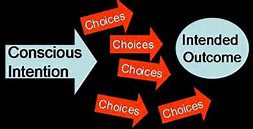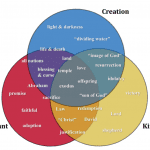If you’re not intentional in how you read and apply the Bible, you’ll likely compromise rather than contextualize.
Unintentional Compromise
The only things that happen by accident are accidents. As we all know, not all accidents are created equal. Ask your insurance company. Is it any surprise that we tend to compromise biblical teaching when we do not deliberately take steps to contextualize in a way that is both biblically faithful and culturally meaningful?
Consider a few simple facts. We all have limited perspectives. We all have biases. Our understanding of historical documents and contexts is partial at best. The Bible reveals the work and character of an infinitely glorious God, whom we could never comprehend fully within our little mind.
If we are not purposeful, then we are presumptuous.
If we are not intentional about how to contextualize, then we presume that our personal, cultural and denominational perspective is sufficient to contextualize the biblical message in a cross-cultural context.
As a result, we will commit either cultural syncretism or theological syncretism.
Intentional Contextualization
Intentionality is critical if you want to contextualize well.

I offer a few simple suggestions to help you become more intentional in your approach. This post gives the first idea; my next post will explain a second suggestion. (In One Gospel for All Nations, I offer a more comprehensive and practical model for biblical contextualization. A few statements below will make more sense to those who have read the book.)
In the early steps of the contextualization process, we need to intentionally look for the presence of key cultural themes within Scripture. Where does the biblical text speak of things that are important in the our cultural context?
In other words, actively look for honor-shame themes in the Bible.
Of course, don’t assume that honor-shame themes appear only in those places where the words “honor” or “shame” exist. For instance, collective identity is a major honor-shame motif but that issue manifests in countless texts that never explicitly mention “honor” and “shame.” In the process, a mass of potential insights will emerge (though many will no doubt be shown to be specious).
Someone might reply that we verge on eisegesis by so actively looking for certain ideas. In reality, simply looking for ideas is not the critical issue. WHO looks for a given theme is far more influential.
Imagine the person who has long been trained to see the legal language in the Bible and so is a bit reticent to embrace an honor-shame perspective when reading the Bible. His or her entire worldview and theological perspective act as a guard against ideas that are seem novel. Therefore, what happens when he forces himself to actively look for unfamiliar concepts?
Figuratively speaking, he does nothing more that use a chair to glance over the cultural wall that obstructs his vision of the world beyond the bounds of his own family, church, and friend groups. In reality, this is precisely the action of a humble learner.
Intentional or Ignorant?
The greater danger is found in the opposite situation–– when someone refuses to stretch their gaze beyond the scope of their normal perspective.
![frog_in_the_well [credit- bing.com http-_yankeekatha.blogspot.com_2010_04_blog-post_20.html]](https://wp-media.patheos.com/blogs/sites/576/2015/10/frog_in_the_well-credit-bing.com-http-_yankeekatha.blogspot.com_2010_04_blog-post_20.html_1-e1445235926186.jpg)
This error (of being content with our narrow perspectives) can reveal as much pride as prudence. After all, there may not be a necessarily contradiction between one’s long held views and those espoused by others. Thus, one’s worries are not only unfounded but he or she misses out on legitimate insights.
Perhaps, the traditionalist fears what it might lead to if they accepted such a new perspective. However, this is an irrational fear. It is like the proverbial well frog denying the reality of the outside world because, if that world exists, there might be predators that might kill that frog. It’s irrational to deny the reality of another perspective simply because you might not like the discomfort it causes.













